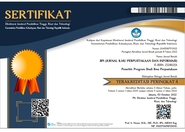Strengthening Religious Moderation through PTKIN and SIT Collaboration to Build Social Harmony
Abstract
This research aims to strengthen religious moderation through information-based education, which is conducted through collaboration between North Sumatra State Islamic University (UINSU) and Jabal Noor Integrated Islamic High School. This research was motivated by the low understanding of Jabal Noor Integrated Islamic High School students about the concept of religious moderation, which was previously only recorded at 40%. Using a qualitative approach and case study method, data was collected through interviews, observations, and documentation from principals, teachers, and students. The community service program in the form of counseling succeeded in increasing students' understanding of religious moderation, which after the implementation of the activity increased to 85%. The results showed that this collaboration succeeded in strengthening students' understanding of religious moderation and contributed to the formation of social harmony at school. Information-based education through counseling provides a better understanding of the importance of moderation in daily life, as well as how moderation values can be applied to support peaceful social life in the school environment. The implication of this research is the importance of strengthening collaboration between higher education institutions and schools in developing educational programs that promote religious moderation as a basic value in student character building, as well as encouraging a more inclusive atmosphere of social harmony in the community.
Keywords
Full Text:
PDFReferences
Abdullah, A., Muawaroh, M. L., & Ismail, M. (2023). Pesantren dan Moderasi Beragama; Peran Kiai dalam Membentuk Sikap Moderasi Beragama Mahasantri. EL-BANAT: Jurnal Pemikiran dan Pendidikan Islam, 13(1), 142-161.
Anandari, A. A. (2024). Bijak Beragama di Dunia Maya: Pendidikan Karakter Era Digital. CV Jejak (Jejak Publisher).
Andiono, N. (2024). Konstruksi Pendidikan Moderasi Beragama Berbasis Kearifan Lokal Pesantren. JALIE; Journal of Applied Linguistics and Islamic Education, 8(01), 23-44.
Anggriawan, K. (2024). THE PRECEPTS OF INDONESIAN UNITY AS MATERIAL FOR REFLECTION ON IMPLEMENTING HUMAN RIGHTS VALUES. Cakrawala: Journal of Citizenship Teaching and Learning, 2(1), 21-29.
Arifin, Z., & Aqso, M. (2023). Aktivisme Moderasi Beragama Dalam Menangkal Radikalisme Di Sekolah Menengah Atas Kota Medan: Studi Etnografi SMA Swasta Sultan Iskandar Muda. Tawazun: Jurnal Pendidikan Islam, 16(3), 471-486.
Casmana, A. R., Dewantara, J. A., Timoera, D. A., Kusmawati, A. P., & Syafrudin, I. (2023). Global citizenship: preparing the younger generation to possess pro-environment behavior, mutual assistance and tolerance awareness through school engagement. Globalisation, Societies and Education, 21(1), 15-32.
Castells, M. (2015). Networks of outrage and hope: Social movements in the Internet age. John Wiley & Sons.
Creswell, J. W. (2014). Research design qualitative, quantitative, and mixed method approaches. SAGE Publication. Inc.
Dalimunthe, M. A., Syam, A. M., Suhendar, A., & Al-Mujtahid, N. M. (2024). Deconstructing Islamic Cyberculture: Mitigating Inferiority and Cancel Culture in Virtual Space. OPINI: Journal of Communication and Social Science, 1(2), 12-26.
Hasan, K., & Juhannis, H. (2024). Religious education and moderation: A bibliometric analysis. Cogent Education, 11(1), 2292885.
Huntington, S. (1996). The Clash of Civilizations and the Remaking of World Order.
Inayatillah, I. (2021). Moderasi Beragama di Kalangan Milenial Peluang, Tantangan, Kompleksitas dan Tawaran Solusi. Tazkir: Jurnal Penelitian Ilmu-Ilmu Sosial Dan Keislaman, 7(1), 123-142.
Jenkins, H., & Ito, M. (2015). Participatory culture in a networked era: A conversation on youth, learning, commerce, and politics. John Wiley & Sons.
Marti, A., Nuzuli, A. K., & Firtanosa, A. (2023). Peran Video Dakwah di Youtube dalam Meningkatkan Kesadaran Keagamaan pada Remaja di Era Digital. Calathu: Jurnal Ilmu Komunikasi, 5(2), 102-118.
Mubarok, G. A., & Muslihah, E. (2022). Peran Guru Pendidikan Agama Islam Membentuk Sikap Keberagaman dan Moderasi Beragama. Geneologi PAI: Jurnal Pendidikan Agama Islam, 9(1), 115-130.
Muthahhari, T. (2017). Survei UIN Jakarta: Intoleransi Tumbuh di Banyak Sekolah dan Kampus. Tirto.id. Archived: https://tirto.id/survei-uin-jakarta-intoleransi-tumbuh-di-banyak-sekolah-dan-kampus-czQL#google_vignette. Diakses: 08 Oktober 2024. 11.47.
Ni'am, S. (2023, April). Islam, Moderation, and Prospects Indonesian Islamic Education for the World. In The 1st Annual Conference of Islamic Education (pp. 161-191). Atlantis Press.
Rahmat, A. (2023). Internalisasi moderasi beragama dalam pendidikan agama Islam. Jurnal Pendidikan Agama Islam, 1(2), 55-66.
Sas, M., Ponnet, K., Reniers, G., & Hardyns, W. (2020). The role of education in the prevention of radicalization and violent extremism in developing countries. Sustainability, 12(6), 2320.
Sugihartati, R., Suyanto, B., & Sirry, M. I. (2020). The shift from consumers to prosumers: Susceptibility of young adults to radicalization. Social Sciences, 9(4), 40.
Sugiyono. (2017). Metode penelitian kualitatif. Alfabeta.
Suharto, B. (2021). Moderasi Beragama; Dari Indonesia Untuk Dunia. Lkis Pelangi Aksara.
Suhendar, A., Syam, A. M., & Ritonga, A. R. (2023). Efektivitas Instagram Sebagai Ruang Motivasi Hijrah Mahasiswa IAIN Lhokseumawe. KomunikA, 19(02), 12-20.
Ulfa, M. (2024). Menjaga Moderasi Beragama di Era Digital: Tantangan dan Strategi Menghadapi Teknologi. Book Chapter of Proceedings Journey-Liaison Academia and Society, 1(1), 43-63.
Vissing, Y. (2022). Extremism vs. human rights: How ideology is built, nurtured, and transforms societies. In Discourses of globalisation, ideology, and human rights (pp. 83-111). Cham: Springer International Publishing.
Wardah, F (2023). Setara Institute: Jumlah Pelajar yang Intoleran Aktif Meningkat, 83% Nilai Pancasila Bisa Diganti. VOA Indonesia. Archived: https://www.voaindonesia.com/a/setara-institute-jumlah-pelajar-yang-intoleran-aktif-meningkat-56-setuju-syariat-islam/7097499.html. Diakses: 08 Oktober 2024. 11.47.
Wedi, A., Zulhazmi, A. Z., & Anwar, M. Z. (Eds.). (2020). Wacana Keagamaan di Indonesia Pasca Reformasi. IAIN Surakarta Press.
Yusuf, M. Z., & Mutiara, D. (2022). Diseminasi Informasi Moderasi Beragama: Analisis Konten Website Kementerian Agama. Dialog, 45(1), 127-137.
Zuhdi, M. (2018). Challenging moderate Muslims: Indonesia's Muslim schools in the midst of religious conservatism. Religions, 9(10), 310.
DOI: http://dx.doi.org/10.30829/jipi.v9i2.21829
Refbacks
- There are currently no refbacks.
Copyright (c) 2024 Syukur Kholil, Ismail Marzuki, Maulana Andinata Dalimunthe, Aris Suhendar, Rahmansyah Fadlul Al Karim Rambe

This work is licensed under a Creative Commons Attribution-ShareAlike 4.0 International License.










_1.png)
.png)
_.png)

